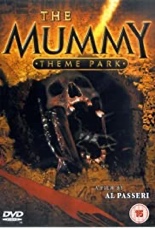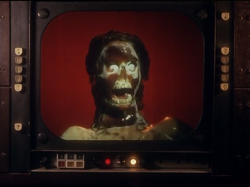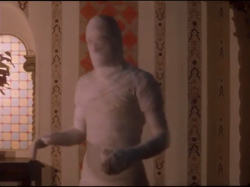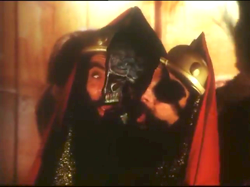
 When I was around 12 years old, almost every weekend I’d walk the mile up the road to the closest Blockbuster and rent three or four movies, with its cult selection the best thing I had ever since Sound Warehouse shut its doors forever.
When I was around 12 years old, almost every weekend I’d walk the mile up the road to the closest Blockbuster and rent three or four movies, with its cult selection the best thing I had ever since Sound Warehouse shut its doors forever.
As basic as the small group of movies were, it did have the Shinya Tsukamoto film Tetsuo: The Iron Man, a cyberpunk masterpiece of gray-matter metal, complete with a massive drill as a penile substitute. Shocked and awed, I copied the film on my VHS setup and watched it repeatedly for the next year, becoming a big fan of Tsukamoto in the process.
While I have seen many of his films since, the pseudo-period piece Gemini has always escaped my eyes until now, ultimately revealing his most challenging film yet. Based on the short story by Edogawa Rampo, it is set in the Japan of 1910 as former military doc Yukio (Masahiro Motoki) has settled down, now practicing private medicine and married to the charming amnesiac, Rin (Ryo).
 With a plague destroying the surrounding slums, Yukio finds his upper-crust world crumbling when he saves a drunk politician instead of a poor mother and her baby. As a somersaulting man in dirty robes invades his house and kills his parents, Yukio soon finds himself stuck at the bottom of a well as the homeless villain — who looks exactly like him, by the way — takes over his life above.
With a plague destroying the surrounding slums, Yukio finds his upper-crust world crumbling when he saves a drunk politician instead of a poor mother and her baby. As a somersaulting man in dirty robes invades his house and kills his parents, Yukio soon finds himself stuck at the bottom of a well as the homeless villain — who looks exactly like him, by the way — takes over his life above.
While trapped, Yukio reverts to an animal-like state while the interloper, named Sutekichi (also Motoki), seduces said wife as we learn of the impoverished life and lusty connection they once had as well.
Utilizing a well-versed combination of classic filmmaking skills and industrial know-how, Gemini is an uncomfortable film, possibly more than any of Tsukamoto’s other kinetic flicks, if only for his ability to have his already-unlikable characters mechanically transform into even worse human-sized kaiju who can do more destruction than Godzilla and Gamera combined.
It’s something that, unexpectedly even for this type of film, is on full display here, both physically and emotionally. It’s pure grotesquerie that, if you’re able to connect with it, can leave anyone fully unsettled, just as much when I saw Tetsuo all those maggot-riddled years ago. —Louis Fowler






 At the risk of earning a Motor City-style ass-kicking from the assorted toughs who make up the cast and crew of the independent film
At the risk of earning a Motor City-style ass-kicking from the assorted toughs who make up the cast and crew of the independent film  What story there is revolves around war vet Jake Ramsey, a guy with apparent PTSD and constant heavy breathing when moving around, often grunting “shit” under his breath. From what I could gather, his sister is found raped and possibly murdered on the mean streets. His Detroit PD buddy fills him in on the possible perps: three gang members who stand around talking in badly recorded conversations.
What story there is revolves around war vet Jake Ramsey, a guy with apparent PTSD and constant heavy breathing when moving around, often grunting “shit” under his breath. From what I could gather, his sister is found raped and possibly murdered on the mean streets. His Detroit PD buddy fills him in on the possible perps: three gang members who stand around talking in badly recorded conversations.

 Frustration boils as panic almost immediately sets in; complains Matt, who isn’t helping matters, “Can you not be so defeatist?” (Also not a calm influence? The score’s simple tinkling of a lone piano key.)
Frustration boils as panic almost immediately sets in; complains Matt, who isn’t helping matters, “Can you not be so defeatist?” (Also not a calm influence? The score’s simple tinkling of a lone piano key.) 

